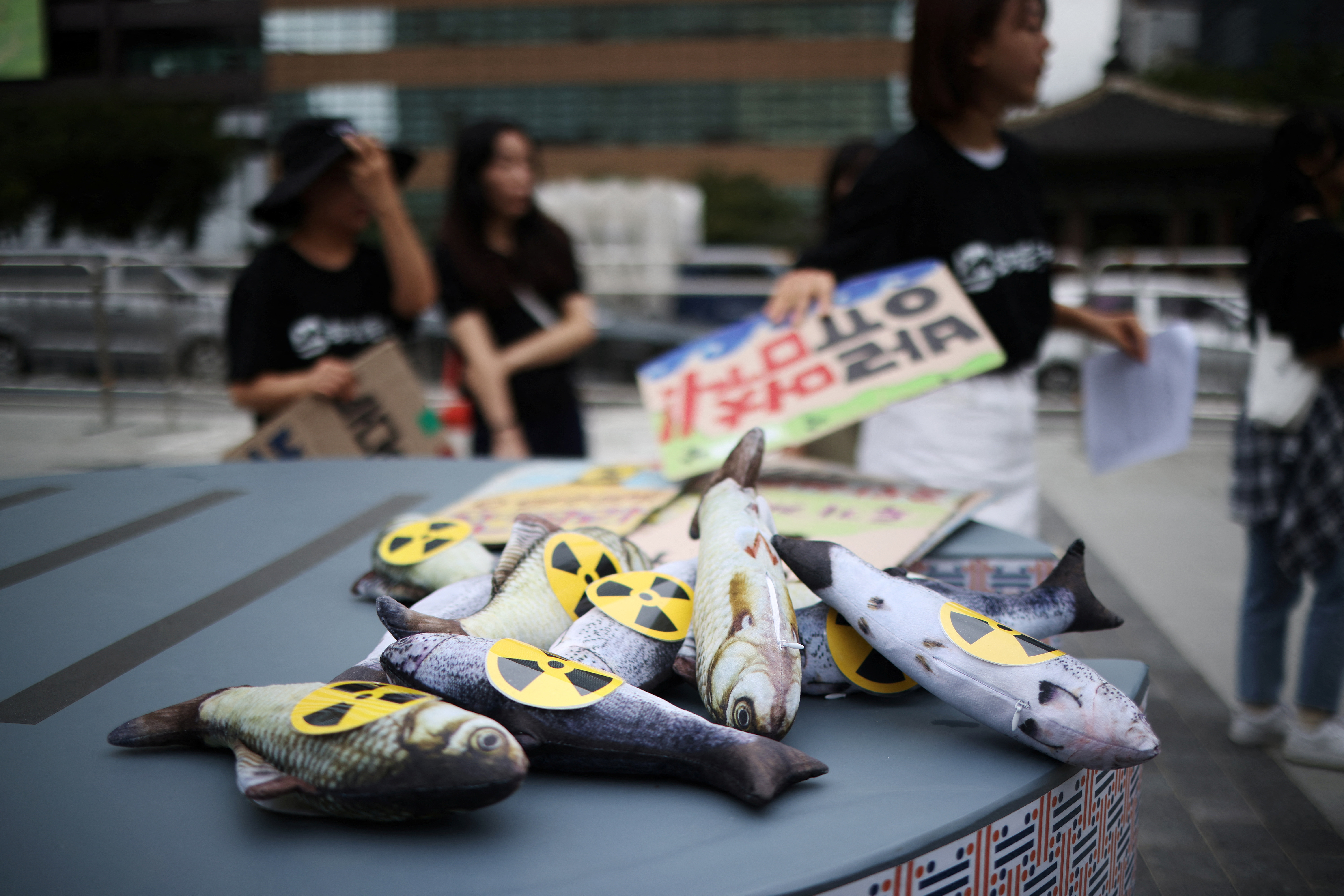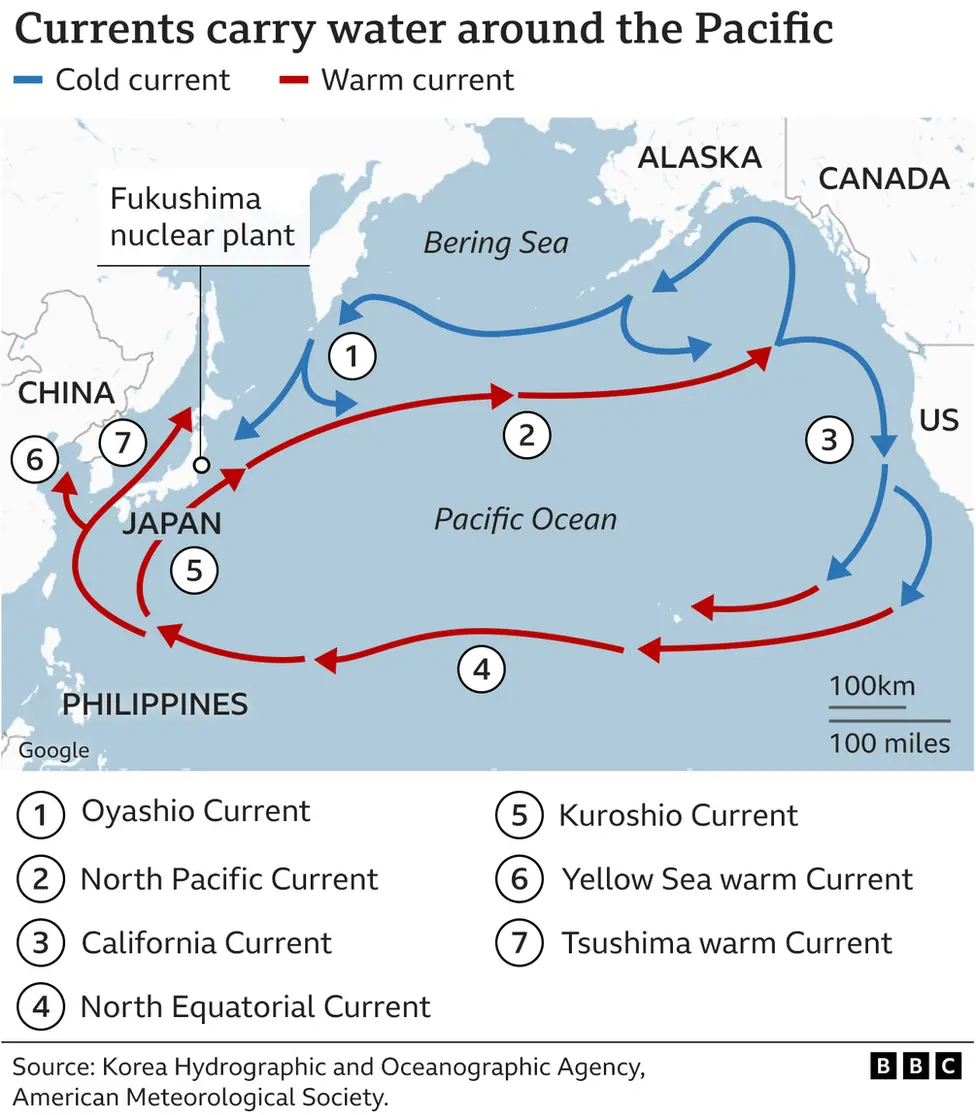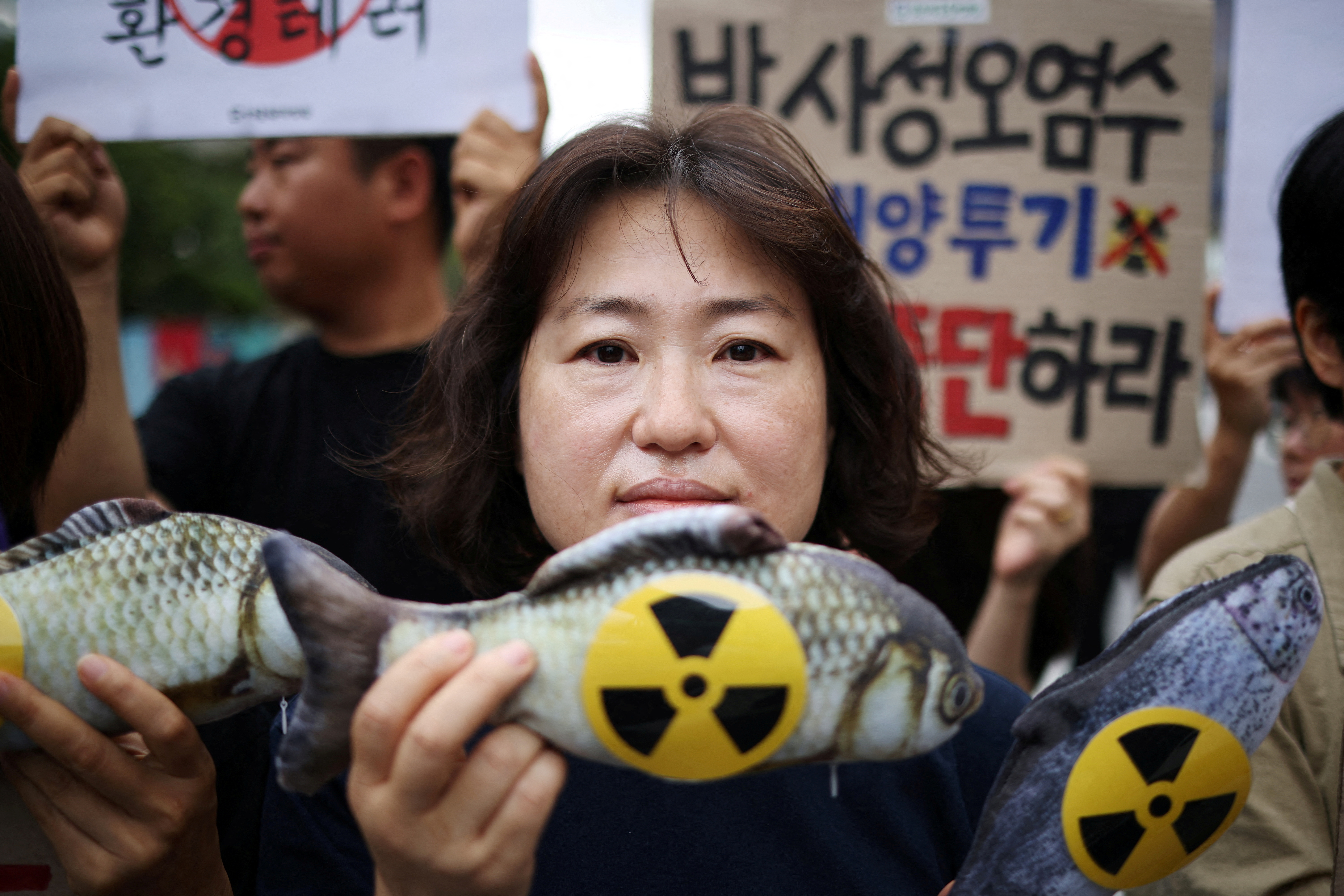
Radioactive water may make Japanese fish toxic if contamination levels are high. Careful monitoring ensures seafood safety.
Japan faces concerns over radioactive water affecting marine life. The Fukushima disaster released radioactive materials into the ocean. This raised fears about seafood contamination. Authorities monitor radiation levels to ensure food safety. Strict guidelines help protect consumers. Japanese fish undergo regular testing to detect any harmful substances.
The government aims to maintain public confidence. Eating fish remains a staple in Japanese cuisine. Ensuring safe consumption is a priority. Regular updates inform the public about radiation levels. This transparency builds trust in seafood safety. Global markets also watch Japan’s handling of the issue closely. Ensuring the safety of Japanese fish is crucial for both local and international consumers.

Credit: www.reuters.com
Sources Of Radioactive Water
The concern about Japanese fish being toxic stems from several sources of radioactive water. These sources have raised questions about the safety of consuming fish from affected areas.
Fukushima Disaster
The most significant source is the Fukushima Daiichi nuclear disaster. In 2011, an earthquake and tsunami struck Japan, leading to a meltdown at the Fukushima nuclear plant.
The meltdown released large amounts of radioactive water into the Pacific Ocean. This contaminated water has since been a major concern for marine life and human health.
Ongoing Contamination
Even years after the disaster, there are ongoing contamination issues. The plant continues to produce radioactive water due to the cooling process needed to manage the melted reactors.
The Japanese government and TEPCO (Tokyo Electric Power Company) have been working to contain this water. Yet, some of it still leaks into the ocean.
Here is a table summarizing the sources of radioactive water:
| Source | Description |
|---|---|
| Fukushima Disaster | Meltdown and release of radioactive water into the ocean |
| Ongoing Contamination | Continuous production of radioactive water due to cooling processes |
Understanding these sources helps in assessing the potential risks to seafood. It also aids in determining the necessary precautions to ensure public safety.
Impact On Marine Life
The release of radioactive water into the ocean has caused concern. People worry about its impact on marine life. Scientists are studying how this affects fish and other sea creatures. The health of marine life is vital for the entire ecosystem. Changes in their environment can have serious consequences.
Affected Species
Several species are at risk due to radioactive water. These species include:
- Tuna: Tuna is a popular fish worldwide. Scientists are monitoring its radiation levels.
- Salmon: Salmon are migratory fish. They could carry radiation over long distances.
- Seaweed: Seaweed absorbs nutrients from water. It could also absorb radiation.
- Crustaceans: Crabs and lobsters might be affected. They live on the ocean floor where particles settle.
Scientists use advanced tools to track radiation in these species. They test fish and other creatures regularly. These tests help ensure that seafood remains safe to eat.
Changes In Marine Ecosystem
Radioactive water can alter the marine ecosystem. These changes can affect food chains and habitats. Some possible changes include:
- Disruption of Food Chains: Smaller fish might get contaminated. Larger fish eat them, spreading radiation.
- Habitat Loss: Radioactive particles settle on the ocean floor. They can harm plants and animals living there.
- Behavioral Changes: Fish may change their behavior. This affects their feeding and breeding patterns.
Scientists are working to understand these impacts. They monitor marine life and track changes. This information helps protect our oceans and the creatures living in them.
| Species | Risk Level | Monitoring Method |
|---|---|---|
| Tuna | High | Regular tissue tests |
| Salmon | Medium | Tracking migration patterns |
| Seaweed | Low | Water and plant samples |
| Crustaceans | High | Sampling ocean floor |
Radioactivity In Fish
The concern about radioactive water affecting Japanese fish is growing. Understanding how radioactivity impacts fish is crucial.
Types Of Radioactive Contaminants
There are different types of radioactive contaminants. The most common are Cesium-137 and Strontium-90. Both are byproducts of nuclear reactions. These elements are highly dangerous.
Cesium-137 can spread through water quickly. It binds to particles and can enter the food chain. Strontium-90 mimics calcium and can build up in bones. This makes it very harmful to both fish and humans.
| Contaminant | Source | Health Impact |
|---|---|---|
| Cesium-137 | Nuclear Reactions | High Radioactivity |
| Strontium-90 | Nuclear Reactions | Bone Accumulation |
Bioaccumulation In Fish
Radioactive elements can accumulate in fish over time. This process is called bioaccumulation. Fish absorb contaminants from water and their food. Over time, the levels of radioactivity in fish can increase.
Smaller fish absorb less contamination. Larger fish, which eat smaller fish, absorb more. This creates a chain of increasing radioactivity.
- Small fish absorb contaminants from water.
- Medium fish eat small fish and absorb more contaminants.
- Large fish eat medium fish and accumulate the highest levels.
Humans eating these fish can be exposed to harmful levels of radioactivity. Monitoring and regulating these levels is crucial for safety.
Health Risks To Humans
The release of radioactive water into the ocean raises serious health concerns. People worry about the potential health risks if they consume fish from affected areas.
Potential Health Effects
Eating fish contaminated with radioactive water can pose health risks. These risks include:
- Cancer: Radioactive materials can damage cells, leading to cancer.
- Thyroid Problems: Radioactive iodine can affect the thyroid gland.
- Bone Damage: Strontium-90 can replace calcium in bones, causing damage.
- Immune System Issues: Radioactive exposure can weaken the immune system.
Vulnerable Populations
Certain groups are more at risk from consuming radioactive fish. These groups include:
- Children: They are still growing and more sensitive to radiation.
- Pregnant Women: Radiation can harm the developing fetus.
- Elderly People: Their immune systems are often weaker.
- People with Pre-existing Conditions: Those with weakened health are more vulnerable.
Regulatory Measures
Regulatory measures ensure the safety of fish in Japan. These measures protect the public from radioactive contamination.
Japanese Government Actions
The Japanese government monitors radioactive levels in water. They perform regular checks on fish and seafood.
- Regular water testing
- Frequent fish sampling
- Public transparency
Authorities set strict limits on radioactive content in fish. They ban sales of fish exceeding these limits.
International Standards
International bodies also set safety standards. The International Atomic Energy Agency (IAEA) provides guidelines.
| Organization | Guidelines |
|---|---|
| IAEA | Radioactivity limits in food |
| World Health Organization (WHO) | Global health standards |
These guidelines help ensure fish safety. Compliance is crucial for international trade.

Credit: www.bbc.com
Scientific Studies
Concerns about radioactive water and its effects on Japanese fish are rising. This section explores scientific studies on this topic. Understanding the research helps clarify the real risks.
Recent Research Findings
Recent studies focus on the impact of radioactive water on marine life. Scientists monitor radiation levels in the ocean. They collect fish samples and test for toxicity. The findings show varying results:
- Some fish show increased levels of radiation.
- Other fish remain within safe consumption limits.
- Long-term effects are still under study.
A study published in Marine Pollution Bulletin found trace amounts of radioactive substances in fish. These levels were below harmful limits. Another study in Environmental Science & Technology reported similar findings.
Expert Opinions
Experts have differing views on the impact of radioactive water. Dr. Yuki Tanaka, a marine biologist, states:
“The current levels of radiation in fish are low. It is safe to eat fish from these waters.”
On the other hand, Dr. Hiroshi Yamamoto, a toxicologist, warns:
“We must continue monitoring fish. Long-term exposure to even low levels of radiation can be harmful.”
Both experts agree on the need for ongoing research. They stress the importance of transparency and public awareness.
Consumer Safety Tips
Many people are worried about radioactive water affecting seafood. Here are some tips to keep your seafood safe and healthy.
Choosing Safe Seafood
Follow these tips to choose safe seafood:
- Buy fish from trusted sources. Look for reputable fish markets.
- Check labels for the origin of the fish. Avoid fish from affected areas.
- Ask your fishmonger about the fish’s origin. They should know.
| Type of Fish | Recommended Origin |
|---|---|
| Salmon | Alaska, Norway |
| Tuna | Atlantic Ocean |
| Cod | North Sea |
Reducing Exposure
Reduce exposure to any potential toxins by following these steps:
- Limit consumption of fish from uncertain sources.
- Cook fish thoroughly. Cooking reduces contaminants.
- Remove skin and fat before cooking. Toxins often accumulate in these parts.
These steps help ensure your seafood is safe and healthy. Stay informed and make smart choices.

Credit: www.reuters.com
Frequently Asked Questions
Is Japanese Fish Safe To Eat?
Yes, Japanese fish is generally safe to eat. Strict regulations and regular testing ensure safety. Authorities monitor radiation levels closely to protect consumers.
How Does Radioactive Water Affect Fish?
Radioactive water can accumulate in fish tissues. However, safety standards are in place to limit contamination. Regular testing helps ensure fish remain safe for consumption.
What Measures Are In Place For Fish Safety?
Japan enforces strict safety measures. Authorities conduct regular radiation testing on fish. Contaminated fish are removed from the market to protect consumers.
Can Radiation In Fish Be Harmful?
Yes, high levels of radiation can be harmful. However, Japan’s rigorous testing ensures fish on the market are safe. Consumers are well-protected by these measures.
Conclusion
Understanding the impact of radioactive water on Japanese fish is crucial. Scientific studies help ensure seafood safety. Consumers should stay informed about current research. Always choose trusted sources for updates on this issue. Awareness and vigilance are key to maintaining a healthy diet and environment.

